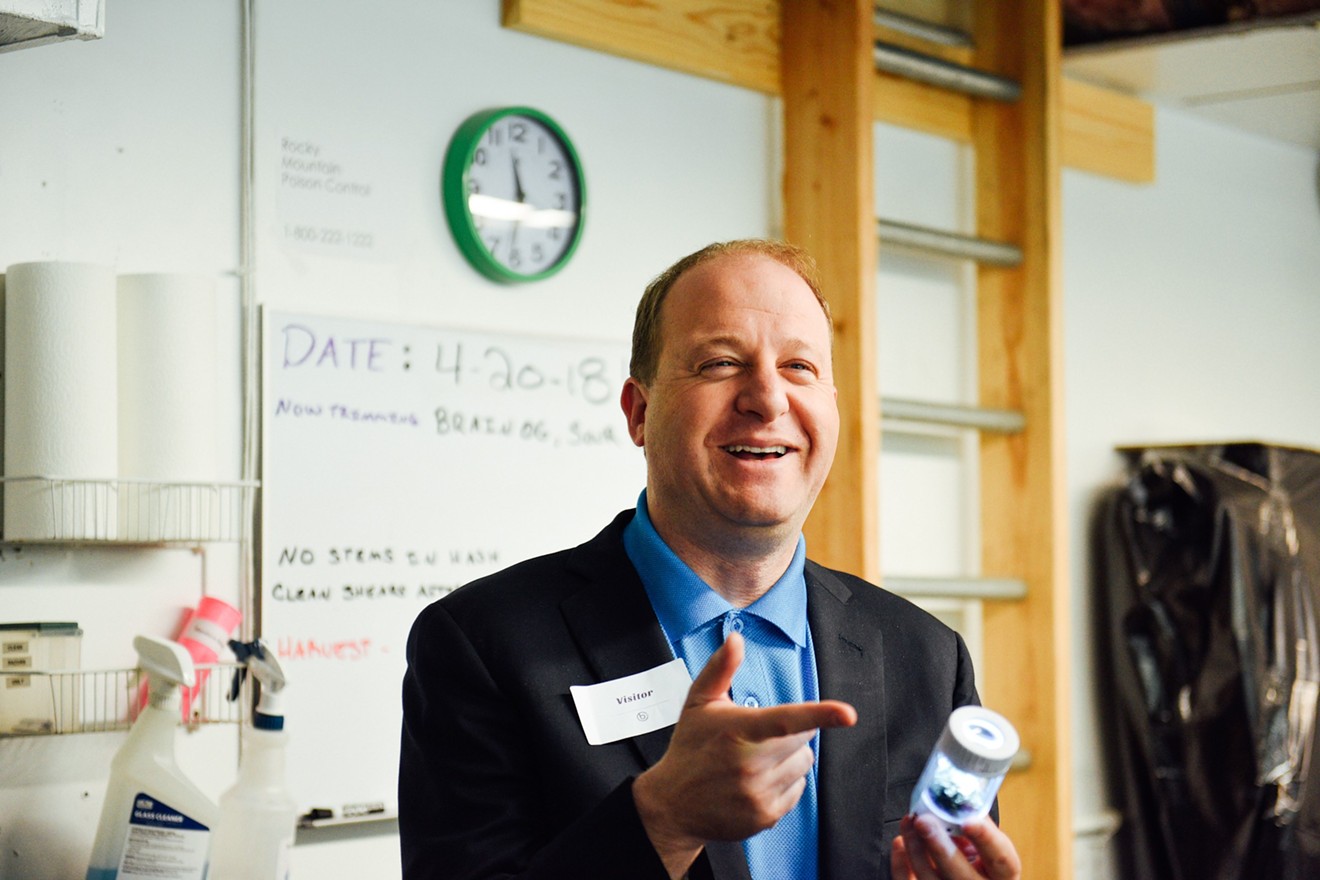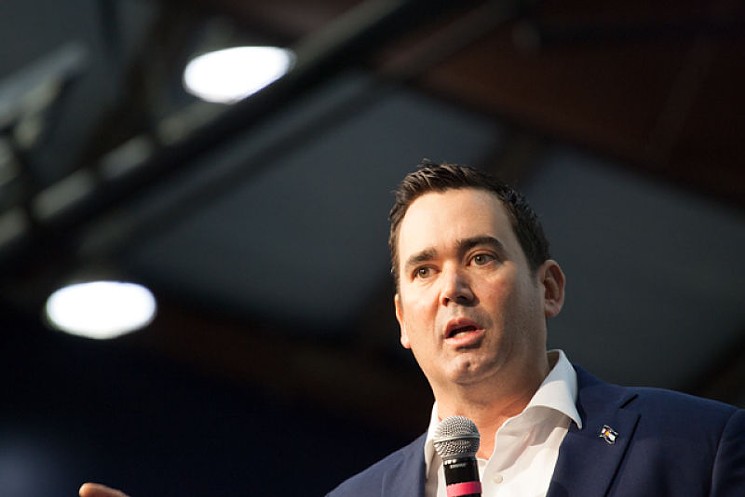While Republican gubernatorial candidate Walker Stapleton has mostly avoided specifics on his health care policy (including declining to answer Westword's multiple requests for an interview on the subject), Polis has been pushing a clear message: universal health care.
The call for universal health care by American politicians isn't a new phenomenon, but it's become a more popular topic on the campaign trail since Senator Bernie Sanders's presidential campaign in 2016. Sanders's flavor of universal health care was "Medicare for all," but there are different ways of achieving the same goal.
Polis sat down with Westword to lay out his plans for the future of Colorado health care.
Westword: Your political opponents are trying to tie you to Colorado Care, the failed 2016 constitutional amendment that would have financed universal health care, despite the fact that you opposed the measure. You are, however, campaigning on universal health care this gubernatorial election. Can you explain why you opposed Colorado Care at the time?
It was a flawed proposal. I'm focused on reducing cost and expanding coverage. Americans in general are being ripped off on health care. Coloradans specifically are being ripped off on health care. We're forced to pay five to ten times as much for the same prescription drug that's available in other countries for a fraction of the cost. There's lack of pricing transparency, and people are being charged hundreds of dollars for Band-Aids at hospitals. Different payers are paying different amounts for the same exact procedure. It is a huge mess, so I think it's about time for states to lead the way and fix it, and I'll be excited to really work on reducing costs both for individuals who pay for health care themselves and for small businesses, and then using the savings to expand coverage for people.
What about Colorado Care was flawed?
For health care to work, you have to show people you're saving them money. I think a lot of people looked at that proposal and thought they might pay even more for health care. The whole point of health care reform is to say, whatever you're paying for health care today — if it's deducted from your paycheck, if you're paying it on your own — we've got a plan to save you money, and for you to be able to keep more of your paycheck and have good health. I don't think Amendment 69 met that criteria. There were additional problems around reproductive health access and how it co-existed with other provisions of our state constitution.
The important thing with any policy area, especially health care, is you have to get the policy right. You have to save people money, and you have to expand coverage. My goal is universal. I'm certainly willing to work pragmatically to expand coverage, but I won't give up until people can stop worrying about losing their health care just because they're between jobs or starting a new company.
Colorado's own Medicaid expansion has drawn the ire of Republicans, who say the state's health care spending is unsustainable as it is. How will you manage universal health care on top of that?
There are over 400,000 Coloradans who have health care coverage because of the Medicaid expansion. When Walker Stapleton says he will eliminate the expansion, that would literally throw 400,000 Coloradans off of their health care with no replacement because largely they are middle-income, low-income people who can't afford health care in the commercial marketplace. That's the opposite of the direction we want to go. We want to, again, expand health care to more Coloradans. Every industrialized nation does it. They all pay less and get more. We're getting ripped off. We're excited to work with other states. We can do it better in a multi-state consortium. I think we might have that opportunity, with other Western states, to negotiate better pricing of prescription drugs and to negotiate better fees for providers. The larger the risk pool, the more the savings we can pass along to consumers and small businesses.
The cost is really what Republicans, like Stapleton, are trying to get at. You're wanting to cover more people and cut down on costs, but where we're at with Medicaid is already —
As a system, having people uninsured is very costly because inevitably people who lack health care insurance are given very costly care in the emergency room rather than preventative care. They are dealt with in a more costly way rather than if we simply did it up front through expanding a basic level of coverage to everybody. We should be able to save money and expand coverage. The two go hand in hand. The route to saving money is expanding coverage, and the path to expanding coverage is reducing costs. The two go hand in hand.
Why do Americans pay, as you've indicated, a bloated amount for health care coverage?
There are a lot of drivers. It's an example of just a broken marketplace. There's no pricing transparency. On the pharmaceutical side alone ... we're paying often five to ten times as much for the exact same prescription [than in other countries] because, for instance, Medicare — our largest payer in our country — is prevented from negotiating for prices on prescription drug rates. Another major provider, the U.S. Department of Veterans Affairs, is allowed to negotiate, so for that exact same drug, you have the VA paying one rate, Medicare paying another rate and private insurance paying another rate. All of those rates are still above what the Germans, British and Canadians pay for a drug made in the same facility with the same box and the same dosage. [Polis is specifically referring to Medicare Part D, the prescription drug benefit program for Medicare recipients.]
We are excited that we have groundbreaking new technologies on all sides of medicine, certainly prescription drugs being one of them, but it shouldn't be done purely at the expense of American consumers. If there's a market for a drug globally, you shouldn't be at a disadvantage simply because you're American.
What are those countries doing that we aren't to secure more affordable health care?
Again, we simply don't allow Medicare to negotiate prescription drug rates. Because the VA does, they're often paying 30 to 40 percent less for the same drug that Medicare and private insurers are paying for.
Have you proposed legislation in Congress to allow Medicare to negotiate drug pricing?
I have long supported allowing Medicare — that's federal, not state. As governor, again, what I want to do through a multi-state consortium is to have negotiating power with providers and prescription drug companies. But yes, federally, I do support Medicare negotiating for prescription drug rates. I also think we need to think outside of the box. I think we need to look at telemedicine opportunities in rural areas and reducing costs through mobile health clinics. Having something like paid family and medical leave will increase the health of families and reduce costs by making sure mothers and fathers can be with their kids during the first few weeks of life and not be worried about losing their home by not making a rent payment. And [focusing on] diet and nutrition, whether it's directly by upping the bar in nutritional centers in our schools or addressing food deserts both rural and urban.
I hear that you're not going to be attending Club 20 for the gubernatorial debate.We had a health care listening tour in Grand Junction, and western Colorado pays some of the highest rates for health care.
tweet this
Well, we challenged Stapleton to thirteen debates and forums. He challenged us to nine; I think there's an overlap of six. So obviously, I'll be at a number of places he won't be at, and he might be at some where I won't be at, but I will definitely be at more. I'm not sure which [one those are].
I'm doing one on the Western Slope. I challenged him to one at the Grand Junction Sentinel.
But Club 20 is an institution for gubernatorial debates. [No Colorado gubernatorial candidate has skipped Club 20 in thirty years.]
Well, the Grand Junction one is televised, and it reaches a broader audience, and we agreed to do one in Grand Junction. If he wants to do a different one, he can do that, but we're excited to reach the most possible people in western Colorado because we opened our first campaign field office in Grand Junction in January of 2017 and are really outperforming how Democrats normally perform in western Colorado. It's a key part of how we're going to win.
It's also where we rolled out our lieutenant governor pick. We had a health care listening tour in Grand Junction, and western Colorado pays some of the highest rates for health care. That's one of the tie-ins. We can fix that by reconfiguring the pricing zones — going to a single pricing zone — for the pricing exchange.
What are the pricing zones?
Currently, we have just artificially designated zones — the state just arbitrarily carved up the state — and, basically, western Colorado has the highest pricing just because of how the zones are configured. Mesa County doesn't, but the rest of western Colorado does. Mesa County is its own zone and has pricing similar to the Front Range.
Why is that?
There's no good reason. They're paying 40 to 50 percent more for health insurance, and there's no good reason for that.
Who made that decision?
It's the way that the state implemented the Affordable Care Act. I'm currently a [congressional] representative for Summit and Eagle counties, but there's a number of other counties affected. And that's one of the areas we plan to fix in the short term that's easier than reaching a multi-state payer.
Did you specifically pick Dianne Primavera as your lieutenant governor because of her health care policy experience? [Primavera is a cancer survivor and former CEO of the Denver-based Susan G. Komen Colorado foundation who served in the Colorado General Assembly for eight non-consecutive years.]
We certainly wanted somebody who was going to be a good partner for delivering on our promise to save people and small businesses money on health care. Dianne was not only most recently the director of the Susan G. Komen Colorado foundation, she worked as a patient advocate for a number of bills in the state legislature. She has worked for state agencies related to health, so she brings a great experience to our administration in being a partner in putting patients and consumers first.Whether you're a Republican or Democrat, who wouldn't want to pay 20 percent less each month for health care and get the same or better health care?
tweet this
During your tours across the state, where would you say health care ranks on the list of constituent priorities?
One of the top issues statewide. We started the general election campaign by choosing Primavera and having a Western Slope health care listening tour. I've visited many facilities and businesses on the Front Range as well, and it's a universal frustration, whether it's a large business that feels their presence in Colorado or America is more costly because they feel the burden of health care is on their shoulders, a small business that pays more per person, an individual who can't leave their job to work part-time or as a consultant because they risk losing their health care, or someone thinking of retiring a few years before Medicare kicks in. Just a lot of frustration across our system because we do it poorly, and Americans are being ripped off. There's not going to be a solution that comes from Washington. I do think the Affordable Care Act was a step forward, but it certainly doesn't address the cost issue. And while it covered more people, it doesn't achieve anything close to universal health care coverage.
Do you anticipate that your plans for universal health care or a multi-state health care consortium will require a ballot initiative?
There's no determination of that yet. Look, there are several ways that the governor can work. One is within the administration and the executive side, and I believe there's a lot we can do through executive order, like the reconfiguration of the pricing zones, looking across each state agency to see what their nexus is to reducing the health care costs. Whether it's the Colorado Department of Transportation or the Colorado Department of Corrections, we want to challenge each agency to, within its mission and its mandate, find additional measures to bring down costs. There's also legislation, of course, that we'll need to pursue. And if necessary, we will go to the ballot.
Will adjusting the Medicaid expansion pricing zones for individual and small-group health plans impact the state budget?
The geographic zoning doesn't have any budget impact on the state.
Why haven't we already implemented universal health care?
There's no good reason. Every other nation does it. Every nation pays less. People don't have to worry about it, and they deliver it more efficiently. We can do it here; there's no excuse not to. I think it will happen in a number of states first, whether it's through a common-payer system or across several states. I think it will go national, but we have to show that we can do it and that it will save people money. I'm confident that we can do it in Colorado.
What do you believe are the impediments to achieving universal health care?
Like in anything, there are a lot of special interests lined up on the other side. It doesn't mean we don't value the importance of everybody in our health care system — the pharmaceutical industry, hospitals and doctors — but we also have to make sure that we have a health care system that puts patients, not the suppliers, first.
As a country, we spend twice as much of a percentage of our GDP on health care as other Western industrialized nations, and we're in the middle of the pack on results, and we don't have universal health care. One of those drivers are the uninsured, which we pay for in a very expensive way, whether through emergency rooms or urgent care. Another driver of it is lack of transparency in market mechanisms around competition, and another aspect is making sure we deliver health care in rural areas and access to preventative care. There's no one single bullet, but we have a multi-tiered approach to reducing health care costs.
Colorado is a politically diverse state. Many people on the opposite side of the political spectrum from you may be suspicious of universal health care as just another ploy by politicians to try and push "free stuff" on people. How are you converting people over to the idea of universal health care?
Skepticism is good, and of course details matter. What the bottom line is for Coloradans who pay for their own health care, who run small businesses or are large employers: We have to demonstrate that we can save money on health care. Whether you're a Republican or Democrat, who wouldn't want to pay 20 percent less each month for health care and get the same or better health care?
Would you force the uninsured to enroll in health care coverage under your proposed universal health care model, similar to the mandate under the Affordable Care Act? [President Donald Trump repealed the mandate last year.]
That's not our model. When we use that kind of language, it's a misunderstanding. People want access to health care. It's a matter of making sure that people have access to health care in an affordable way. It's not something you're forcing on people who don't want it. That was sort of a bizarre framing that Republicans used at the time of the Affordable Care Act. But the Affordable Care Act, again, failed to deliver to make health care affordable to everybody, and we can do better.
Have you already started reaching out to other states to establish this consortium?
A lot depends on the outcomes of elections. I certainly have relationships with governors or gubernatorial candidates in states like New Mexico and Minnesota. Again, a lot depends on the political landscape post-November, but I would be surprised if there isn't leadership in other states who want to save their residents money on health care. We're working on winning this election in Colorado.
This interview was edited for clarity.
Update, August 14: Polis's campaign has clarified that he was familiar with the Club 20 debate at the time of this conversation.














